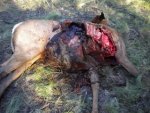bwlacy
WKR
- Joined
- Feb 11, 2015
- Location
- West Michigan
All the new hunting shows are on tv now. I keep seeing people leave their elk overnight to find it the next morning. Everything I read says you need to get the meat cooled down as fast as possible. So is the meat any good on these elk that are left overnight? If I put an arrow in one the last half hour of daylight should we just plan on it being a really late night and bone it out in the dark? There is no way that I want to go thru all that work and training to shoot one finally and have it all spoiled!
Thanks
Thanks

